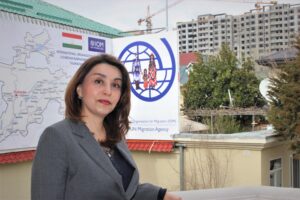There is a widespread feeling that the ongoing system of distribution of Covid-19 vaccines is underperforming and unfair. But just what could a realistic and fair system look like? Which conceptual, practical or moral criteria should be used? Who should decide? This paper reviews recent developments and considers the arguments for possible pathways
 By Iris Borowy
By Iris Borowy
Distinguished Professor
Center for the History of Global Development
Shanghai University, China
Covid-19 Vaccines – On Fairness and Distribution
After 2020 was the year marked by the spread of Covid-19 and various forms of contact restrictions and lockdowns, 2021 is set to become the year of vaccinations – and the discussions and that go with it.
The mood with regards to the vaccine at the beginning of the year should have been jubilant. The development of not only one but several vaccines defeated all expectations. In April 2020, optimistic scenarios foresaw having a vaccine within 12 to 18 months, i.e. between April and October 2021. In reality, vaccinations began in December 2020. This speed has been quite spectacular and might have been a reason for celebration. However, any joy about this success has been short-lived and soon gave way to increasingly bitter complaints, accusations and conflicts about disappointing production and unfair distribution.
In Europe, countless commentators have criticized the slow roll out of the vaccines and the lower-than-expected deliveries. As the manufacturers BioNTech-Pfizer and AstraZeneca informed the EU in January that they would provide far fewer doses during the first quarter of 2021 than originally promised, while deliveries went to the US, the UK and Israel, Spiegel captured the prevalent impression of a “vaccine disaster” and described the growing frustration and anger across Europe: “one of the most affluent regions in the world, is proving to be unable to quickly protect its citizens from a deadly disease, while other countries are showing how it is done.“ The situation led to a profound disillusionment with the EU, especially in Germany, where many people vehemently blamed the EU for the „vaccines fiasco“ and felt that they could have done better on their own. Many pointed to quicker vaccination in Israel and the UK and to the apparently much more successful strategy of the US to buy early and big. The mood in the US was less rosy. Here, deliveries also fell far short of expectations, and some media were left wondering why America’s vaccine plan “was failing so badly”.
Thus, while many people in high-income countries complained about not receiving more vaccines faster, other commentators accused them of having too much already. Journalists, NGOs and other pundists presented accusations of wealthy nations gobbling up vaccines at the expense of poor nations. Already in September 2020, Oxfam warned that “wealthy nations have purchased 51 percent of the promised doses of leading COVID-19 vaccine candidates, while representing just 13 percent of the world’s population” and that the me-first attitudes of rich countries would delay or prevent the vaccines from reaching the people who needed them most in all parts of the world. Similar numbers were brought forward by the People’s Vaccine Alliance, a coalition of NGOs including Oxfam, Amnesty International and Global Justice Now. In an article, published in December 2020, they pointed out that rich countries had secured enough vaccines to vaccinate their populations several times over. The article singled out Canada for having bought “enough vaccines to vaccinate each Canadian five times” denouncing it as “the biggest hoarder of COVID-19 vaccine pre-orders in First World.“
The accusations have increased since the beginning of 2021. In January, South African President Cyril Ramaphosa stated at the World Economic Forum’s virtual Davos Agenda that rich countries were hoarding vaccines excluding the majority of the world population. On 10 February, UNICEF Executive Director Henrietta Fore and WHO Director-General Tedros Adhanom Ghebreyesus issued a joint declaration criticizing that of 128 million vaccines administered until then, more than three quarters had gone to just ten countries accounting for 60 percent of global GDP, while almost 130 countries, home to 2.5 billion people, had not yet received any. This strategy, they explained, would cost lives and make people less safe everywhere. These numbers were taken up by UN Secretary General António Guterres during a high-level meeting of the UN Security Council on 17 February 2021. He condemned a “wildly uneven and unfair” distribution of vaccines and called vaccine equity “the biggest moral test before the global community.”
Clearly, there is a widespread feeling that the ongoing system of distribution is underperforming and unfair. But just what could a realistic and fair system look like? Which conceptual, practical or moral criteria should be used? Who should decide? This paper reviews recent developments and considers the arguments for possible pathways.
The Arguments
There is no denying that rich countries have ascertained vastly more access to vaccines than poor countries. Nevertheless, the situation seems more complicated than a simplistic black and white picture. A closer look at the arguments reveals some of the problems at hand. When the People’s Vaccine Alliance hurled its accusations against Canada in December 2020, none of the six vaccines the Canadian government had procured had actually been approved. In other words, they were all still undergoing trials, and at the time there was no way of knowing whether all, some or none of them would eventually come about. Two months later, three (BioNTech-Pfizer, Moderna and Oxford-AstraZeneca) had received international authorization, two (Novavax and Janssen/Johnson&Johnson) were still undergoing trials and one (Sanofi-GlaxoSmithKline) had delayed its own vaccine program because of unsatisfactory results during trials, deciding instead (upon prodding of the French government) to help produce vaccines of its competitor BioNTech-Pfizer. It is possible that one or even all three of them will never become usable vaccines, in which case Canada would receive only half of the pre-purchased vaccines and would have spent half of its investment on unsuccessful R&D. The other half would have helped finance the successful development of vaccines, which people all around the world urgently need. In fact, at the time of writing in mid-February 2021, Canada had received only an extraordinarily small number of vaccine doses, coming from the EU because companies producing in the United States are subject to an export ban. Henrietta Fore, Executive Director of UNICEF acknowledged the essentially beneficial nature of these early orders, explaining that “[i]nitially, “over-contracting” was justified because countries were investing much-needed capital into promising research and development.” At that point, the pre-ordering had the effect of accelerating the process of making these vaccines come into existence, a crucial – though hardly sufficient – precondition for getting vaccines for all countries, including low-income countries in the global South. Thus, Canada forms an example of being both perpetrator and victim of a system of vaccine nationalism, as well as an active participant in a system in which early governmental investments have enabled drug manufacturers to produce vaccines at record speed.
Another line of criticism has focused on pharmaceutical companies and a system of production based on for profit corporations. Oxfam argued that this situation exposed “a broken system that protects the monopolies and profits of pharmaceutical corporations and favors wealthy nations, while artificially restricting production and leaving most of the world’s population waiting longer than necessary for a vaccine.” Similarly, a Washington Post commentator accused the companies of enriching themselves at the expense of indigent people, arguing that “the greed of naked capitalism will be the major obstacle to keep the world safe from the virus and its political and economic shockwaves.” While the pharmaceutical industry has a well-established record of being no stranger to greed, highlighting it as the single most important reason in determining the distribution of vaccines overlooks a lot of context. In a situation, in which governments are offering much-needed research funds in return for options on potential future doses, can companies really be blamed for engaging in contracts that provide them with finances which accelerate – or even make possible – their development of vaccines? It seems problematic to argue that they should either not have accepted these funds or should have accepted them and then broken those contracts. Meanwhile, at a time when people in their countries are dying or losing their livelihoods because of economic restrictions, it is problematic to argue that governments should not have used pre-purchases as a tool to speed up obtaining vaccines for their populations if they had the opportunity to do so.
The problem about this is clearly the mixture between the need for life-saving drugs, on the one hand, and company profits on the other. Some critics have considered this mixture unethical in itself. Heidi Chow, from Global Justice Now has called on governments to ensure that the pharmaceutical industry put “people’s lives before profits.” However, private companies are commercial entities which have to generate profits in order to survive. Those that don’t will fail (and no longer produce vaccines). Indeed, the development of drugs, including and especially vaccines, is risky business. Developing a vaccine typically takes more than ten years and costs up to $500 million. It also typically involves many unsuccessful attempts, with over 90% of efforts failing between animal studies and the registration of a final product. Even successful efforts may turn out to be economic failures if the demand evaporates with a decline of the disease. In the past, companies have repeatedly engaged in vaccine development at their own peril. For example, several companies undertook research for a vaccine against Ebola after the outbreak of the disease in West Africa in 2014. They all took major losses on their investments. The first vaccine, originally developed by a Canadian government laboratory and produced by Merck, was approved in 2019, years after Ebola and any interest in a vaccine had died down. In a market system, therefore, profits are necessary not only to cover the R&D costs for actually marketed drugs, but also the costs of potentially numerous and expensive failed attempts. Still, this does not eliminate the question of how much profit is ethical and how much constitutes greed.
Besides, as many observers have correctly pointed out, R&D for Covid-19 vaccines has received large sums of public money, thereby shifting much of the risk from the private to the public sector. This fact has been used to argue that companies should not be considered the owners of the vaccines they have developed and are manufacturing but that they should be considered the public property of those societies that financed them. For instance, in an open letter to then president-elect Biden, Oxfam America argued that “US taxpayers have already committed more than $10 billion in public money towards a COVID19 vaccine. A vaccine paid for by the people should work for the people and remain of the people.” (bold in the original) The problem about this reasoning is that billions of people around the world have not paid or committed tax money towards a vaccine. Arguing that people should be entitled to a vaccine because they paid for it suggests that people who have not paid should not be entitled. It is a basically a capitalist and nationalist argument which does little to address the global discrepancy of access. Distributing Covid-19 vaccines according to people’s needs rather than wealth requires that people receive the vaccine without having paid for it while other people, who have paid for it through their tax money, would need to wait. By implication this means that a global distribution of Covid-19 vaccines purely according to people’s needs requires that stake holders, including companies, governments and citizens, act altruistically, potentially putting the interests and the wellbeing of themselves and those near them behind those of unknown people far away. But pure altruism is not the human condition. Neither is pure selfishness. In the real world, people make decisions on the basis of different, sometimes contradictory incentives. If the aim is to find a system that provides sufficient vaccines to all those who need it as fast as possible, the question might be which system provides the best mixture of incentives.
The challenge is not new. It has been around and discussed with regard to pharmaceutical production for many years. Elsewhere, I have argued in favor of a system of pharmaceutical production which makes knowledge freely available, making use of innovative research frameworks such as open-source drug research. But Covid-19 has formed a particular challenge to global vaccine management, similar to regular drug production but involving specific requirements of quantity and speed. This may not be the moment for long-term systemic transformations but for pragmatic strategies that promise quick results. While it is too early for a full analysis of the process, a limited overview of the last year suggests some strengths and weaknesses of potential strategies.
The Record of 2020
The vaccination of a population consists of several separate but inter-related steps: Based on an initial understanding of the virus, its structure and how it works, vaccines must be developed, produced to scale, distributed and finally administered to populations. For a successful vaccination process all of these steps must work well. Every one of them is complicated and dependent on a variety of contexts.
Initially, much of the laboratory research was marked by an unprecedented degree of international cooperation. As early as 12 January 2020, Chinese scientists made public the viral genome. In ways that went completely against conventional methods of scientific research geared towards publications, scientists then openly shared their findings on online repositories or WHO conference calls, sometimes within hours. An understanding of the science was much facilitated by its similarity to known coronaviruses, notably SARS and MERS. It took only days until the German Center for Infection Research at Charité, Berlin, which was headed by a renowned expert on coronaviruses, had developed a diagnostic test and shared it with WHO for free use. Some companies also tried to chip in. Medtronic made its ventilator design freely available, waiving its IP rights and Lego allowed users to modify its Lego Mindstorms products for robotics instruction in middle schools. However, pharmaceutical companies showed little enthusiasm for such shared innovation. In May 2020, WHO, together with over 40 member states, established a Covid-19 Technology Access Pool (C-TAP), as a platform for sharing information, knowledge, data and other resources of intellectual property to prevent unnecessary duplication of efforts and speed up the development of products helpful against the pandemic. The program experienced not a single contribution during the next eight months. Vaccine research in the pharma industry unfolded in largely conventional ways, in competition with one another.
Work towards a vaccine began almost immediately. In China, the Nasdaq-listed biotech company Biovac started a research program in late January, less than a week after Wuhan went into full lockdown. Around the same time, the Coalition of Epidemic Preparedness Innovation (CEPI), a consortium established at the World Economic Forum in 2017, co-founded and co-funded by a combination of the Bill and Melinda Gates Foundation, the Wellcome Trust and a growing list of countries, became active. On 23 January, CEPI announced funding to two companies (Inovio and Moderna) and the University of Queensland to develop a vaccine. At the same time in Germany, a small company in Mainz, BioNTech, initiated its project “Lightspeed,” designed to produce a vaccine.
The scenery of vaccine developer virtually exploded. In April 2020, there were 115 candidates for vaccines, of which 78 were confirmed cases with publicly available information. Of the latter, 56 were being developed by industry, 22 by academia, the public sector or other non-profit organizations. 36 confirmed developers were situated in North America, 14 in China, 14 in other Asian countries and Australia, and 14 in Europe. By early July 2020, international researchers were working on 158 vaccine candidates, of which 135 were in preclinical or exploratory stage. By the end of the month, the number of vaccine candidates had grown to more than 200. While these developers included some of the large pharmaceutical companies, such as Janssen (belonging to Johnson & Johnson), Sanofi, Pfizer and GlaxoSmithKline, early on that small, comparatively unknown and inexperienced laboratories were taking the lead. Many accelerated the process by conducting phase I to III trials simultaneously, reducing a process that usually takes years to merely months. The process carried economic risks, because expensive phase II and III might turn out to be wasted if a substance ended up not passing phase I. But it was a risk considered necessary because speed was of utmost importance not only to stop the pandemic as fast as possible but also to be competitive in a very large field of contenders for the first vaccines. Compressing the usual time frame even further, manufacturers also needed to begin preparations for scaled-up production in parallel, before they had a functional vaccine in hand or before they even knew if they would ever have one.
Bringing an existing vaccine up to scale for mass production is a complicated and expensive process. It involves handling sensitive live microorganisms in complex processes which are often difficult to control, turning naturally variable biological processes and products into standardized products of high efficacy and safety. This requires not only specialized equipment but also the meticulously coordinated collaboration of numerous experts in planning, process development, equipment modifications, process adaptations, quality controls, and registration, easily amounting to hundreds of individual but interlocking actions. It requires that engineers, scientists, lab technicians, logistics organizers, maintenance crews, smart builders and overall leaders cooperate in ways that are “simultaneously science and technology driven as well as patient focused.” Even within the same company, bringing this process up and running requires a minimum of six months in ideal circumstances. Transfers from one company to another easily takes twice as much. In the case of Covid-19, many of the earliest vaccine producers were small companies faced with this challenge for the first time.
Given this context, it was clear early on that up-scaling production quickly would be expensive and would require massive financial investment, and that, no matter how much funding was available, it would take time before production would be sufficient for the global population. There would be months, possibly years, in which vaccines would be available for some people but not for (potentially many) others. It was also clear that anything that helped up-scaling production would reduce distributional conflicts. Different stake-holders reacted in different ways.
One initiative aimed at ensuring broad access to future vaccines. In late April 2020, a large group of organizations, including the WHO, the Bill & Melinda Gates Foundation, CEPI, the Wellcome Trust, Global Alliance for Vaccines and Immunizations (GAVI) and the World Bank, established the Access to COVID-19 Tools (ACT) Accelerator, self-described as “a groundbreaking collaboration to accelerate development, production and equitable access to COVID-19 diagnostics, treatments and vaccines.” As a pillar in charge of organizing an equitable distribution of vaccines, it created COVAX. The stated goal of COVAX was to provide access to at least 2 billion doses of safe and effective COVID-19 vaccines to both high- and low-income countries by the end of 2021. Originally, the hope was that it would become the central program for the purchase and distribution of global vaccines. This hope quickly faded as governments began investing in funding vaccines for their own use.
Most is known about the US effort entitled Operation Warp Speed, named after the fictitious speed of the Star Wars movies, which funneled massive financing into the process while providing a mechanism to coordinate the cooperation between private companies and various governmental bodies. Discussed since April 2020 and announced on 15 May, the concept was to invest massive funds (originally $ 10 billion, later increased to $18 billion) with the stated goal of providing 300 million doses of safe and effective vaccine by January 2021. The program took into account that this included funding some attempts which would eventually fail but that, in total, this program would massively speed up the process towards a successful outcome for some others.
Since March 2020, at least sixteen drug manufacturers have been reported to have signed contracts with Operation Warp Speed or to have received indirect support, including Johnson&Johnson, AstraZeneca, Cyptiva, Eli Lilly, EmergentBioSolutions, Pfizer, Fujifilm, Regeneron, Vaccitech, Moderna, Novavax, Merck, Sanofi, GlaxoSmithKline, Vaxart and Inovio. They all received millions or billions of dollars in public funds for purposes such as research, scaled-up production of materials, specialized equipment, and contract development. Moderna alone reportedly received $4.1 billion for vaccine development, clinical trials and manufacturing. Part of those funds included the advance-purchase of hundreds of millions of doses of (potential) vaccines and options for future purchases. Pfizer, which partnered with the small German company of BioNTech, received almost $ 2 billion through Operation Warp Speed in July 2020 in an advance purchase for 100 million doses of vaccine with an option on up to 500 million more after approval. Meanwhile, the scientific development mainly took place within BioNTech, supported by $445 million from the German government. Operation Warp Speed was essentially a nationalist program: though non-US companies could take part, vaccine candidates from China were excluded, and the advance-purchases were unapologetically reserved for Americans. More important to President Trump, he hoped to be able to announce a US breakthrough in vaccine production before the presidential election on 3 November.
By September 2020, there were 321 vaccine candidates, including 33 in clinical trials. In contrast to half a year earlier, large multinational corporations played a large role. Of the vaccines in trials, eleven were being developed by Chinese organizations, seven were supported by the US Operation Warp Speed, eight had received funding from CEPI and were included in the portfolio of COVAX.
The European Union (EU) adopted a strategy that was both similar and different. Compared to the other major players, the situation of the EU was more complicated in that it had to reconcile the policies and interests of 27 member countries. In large part, its position was influenced by the disheartening experience of the early phase of the pandemic, where EU countries had engaged in a free-for-all scramble for protective gear and individual countries had competed against each other in global markets provoking justifiable criticism of lack of solidarity. Leading politicians were determined not to make the same mistake again and insisted on common approach in which all member countries should work together, buy vaccines collectively and distribute it equitably among member states according to population size. Eventually, all member states agreed and the EU provided € 2.7 billion for negotiations with six companies whose vaccine candidates looked promising (AstraZeneca, Sanofi-GlaxoSmithKline, Johnson&Johnson, BioNTech-Pfizer, CureVac, Moderna, Novavax and Valneva). But the process took time so that the EU contracts came later than those negotiated by other countries, notably the US and the UK, who received a certain priority for delivery dates. Nevertheless, the EU commission eventually did achieve favorable conditions regarding pricing and product liability for mixed portfolio of – not-yet existing – drugs, a total of 2.3 billion doses of potential vaccine for a population of approximately 450 million people. The approach practiced solidarity within the EU but not between the EU and the rest of the world.
Comparatively less is known about development outside of North America and Europe. A program of at least similar size was conducted by China. By August 2020, thirteen Chinese companies were working on vaccine development, of which nine were conducting human trials, more than in any other country. Chinese researchers faced the enviable problem that by the time they started phase III trials infection rates in their country were too low to allow such trials, so they reached agreements with Brazil, Indonesia and the UAE to conduct trials there. As the first country, China began vaccinations of its population in the late fall, before phase III trials had been finished, a method considered risky by some observers. By mid February 2021, China had approved three vaccines developed by Chinese companies: the state-owned Sinopharm, the private company Sinovac and the vaccine manufacturer CanSino Biologics. The vaccines had undergone phase III trials but data had not been published in peer-reviewed international journals yet. Data from different countries indicate an efficacy of between 50% and 91.25% for Biovac and 79% for Sinopharm. Vaccines by six other manufacturers were in phase I-III trials. Without doubt, substantial public funds went into these processes, but nothing is known about the sums.
The Emergence of Effective Vaccines
The first vaccine to receive national authorization was the Sputnik V vaccine produced by the Gamaleya Research Institute, which was approved in August 2020. However, since at the time the vaccine had not finished phase III trial yet, this news was met with skepticism among scientists. Internationally, the situation changed in December 2020, when the vaccine by BioNTech-Pfizer was the first vaccine to receive emergency authorization, first in the United Kingdom, quickly followed by the US, EU, WHO and many other countries, and soon after the full recommendation by the EU European Medicines Agency. Around the same time, the Chinese government announced conditional approval to a vaccine by Beijing Institute of Biological Products, a subsidiary of the state-owned conglomerate Sinopharm. International approvals for vaccines by AstraZeneca and Moderna soon followed. Of these, mRNA vaccines by BioNTech and Moderna appeared to have a very high efficacy of over 90%, while vaccines by Oxford-AstraZeneca have an efficacy of between 70 and 90 %, and Sinopharm of approximately 79%. In February, a publication in the prestigious Lancet confirmed a high efficacy of Sputnik of over 90%. It was quickly authorized in 26 countries. Within a few weeks, the focus of attention in many countries shifted from how to control dangerously high infection rates through economic and social restrictions to how to get a critical mass of people vaccinated.
In early 2021, the situation was ambivalent: Several manufacturers are supplying vaccines, but scaled up production was below expectations and far away from the demand, leading to bitter struggles. A long list of vaccines seemed near the end of phase III trials and approaching approvals, but Merck, which had been working on two vaccine candidates together with Institut Pasteur, announced giving up these attempts in January. Coming on top of the delay in the Sanofi-GlaxiSmithKline vaccine, this news highlighted that a successful outcome was hardly guaranteed for any of the numerous other vaccines in preparation. Of the existing vaccines, those by BioNTech-Pfizer and Moderna represent a new generation of vaccines, using an innovative method on the basis of mRNA, which appear very effective but are technologically difficult to produce, with special challenges of technology transfer.
In early 2021, a total of 12.8 billion doses of vaccine had been reserved, the largest number committed to the EU, the US and COVAX. The unequal distribution of confirmed purchases was clear, with 7.8 billion doses bought by high-income countries, 4.2 billion doses to upper-middle-income, 1.2 billion doses to lower-middle-income and 582 million to low-income countries. In an already unequal world, in which the Covid-19 pandemic further accentuated inequality last year, it seems morally and politically unacceptable that a heavily slanted vaccine rollout should let it deteriorate even more. Besides, as many commentators have observed, in a globalized world, nobody can be safe from a pandemic until everybody is safe. At the moment, several strategies to improve distribution equity are being suggested and/or followed, all with different implications:
- Donate extra doses when domestic need has been (partially) satisfied
This measure has repeatedly been demanded, among others by UNICEF Executive Director Henrietta Fore who urged “wealthier nations who have bilaterally purchased high volumes to consider donating them through COVAX.” This seems like the easiest and also the most likely strategy. Policy makers in rich countries would not need to spend any extra money, nor would they need to face their citizens’ wrath when explaining why they send vaccine doses away while they are still wanted in their own countries. In fact, the prospect of donating extra doses when the domestic need was satisfied has already been explicitly mentioned both in the EU and the US. In the US case, a government official put forth the strategy in May 2020 by comparing it to familiar direction during plane flights. He called it the “oxygen mask approach” explaining “We want to get our oxygen mask on first and then we’re going to help the people around us.” So, prospects for such donations are looking reasonably good, and at present, CEPI is negotiating with self-financing countries “to ensure that, once a certain percentage of their population has been vaccinated, a percentage of the doses secured through bilateral deals would be shared through the COVAX Facility.”
Given the potentially large quantity of extra doses if all or many of the pre-purchased vaccines actually materialize, this strategy may activate substantial amounts of vaccines, available basically free or very modestly priced. However, it may take many months before this stage is reached and there are obvious moral and health-related problems with this strategy. It lends itself to the somewhat simplistic but also partially accurate accusation of the rich having the poor wait before throwing them leftovers of a life-saving drug. Besides, vaccinating the people of the world according to nationality or financial status instead of vulnerability or infectious potential risks prolonging the pandemic, increasing the risk of mutations which may or may not be preventable by the vaccines and may, therefore, jeopardize the vaccination success in already vaccinated population in high-income countries.
- Donate/sell unilaterally
This policy has been adopted primarily by Russia, India and China who have taken the lead in providing Covid-19 vaccines to low-income countries in the global South. All countries have adopted vaccine diplomacy as a form of soft power. For China, it represents a strategy of visible solidarity and forms a way of improving its global image, which had suffered during the early phase of the pandemic. For India, home to one of the largest pharmaceutical industries in the world, it offers a method of meeting its Asian rival in an area of relative strength. On 15 February 2021, the Chinese ambassador to Zimbabwe handed over a donation of 200,000 doses of the Sinopharm vaccine, promising another batch of 600,000 doses for sale and further donation to 57 more African countries. A deal of 38 million doses has been announced with Peru, the country that, for a while, suffered the highest Covid mortality rate worldwide. On 17 February, China’s foreign minister, Wang Yi declared that China had donated vaccines to 53 developing countries, exported vaccine to 22 countries and had launched research and development cooperation on Covid with more than 10 countries.
In a similar move, Russia has sold up to 100,000 doses of the Sputnik V vaccine to Colombia and up to 25 million doses to Argentina. Latin American countries have been particularly hard hit by Covid 19 and have been eager to buy Sputnik V. By mid-February 2021, a total of approximately 200 million doses of Sputnik V had been sold to 20 countries, while more than 50 countries had placed orders for the vaccine. Sputnik is very attractive to many countries since it is easier to store than, for instance, the BioNTech-Pfizer vaccine and only costs half the price, while peer-reviewed data indicated it is 91.6 percent effective. Crucially, Russian deals have also included having Sputnik V produced by companies in India, South Korea and Brazil.
However, their transfers are dwarfed by those of India., which has exported 1.6 billion doses to 20 countries since the beginning of 2021. Relatively wealthy countries, like South Africa, Brazil and the United Arab Emirates, have paid for the deliveries, but reportedly 37% of transfers have been donations. Thus, India has dispatched one million doses of a vaccine to South Africa, and India’s external affairs minister, Subrahmanyam Jaishankar, also announced donating 200,000 doses of vaccine for 90,000 UN peace keepers.
The obvious benefit of this measure is its speed at a time when speed is essential. Besides, for many countries, these deals have seemed at present the only possibility to have access to urgently needed vaccines at a time when they find themselves crowded out of trade with Western companies. These bilateral exports have, therefore, been of immense help to a number of Southern countries. Besides, Southern governments often find trade negotiations with governments or state-owned companies easier than with private companies, because considerations of potential economic losses or product liability play no role or are superseded by political interests. Politically, this process can be expected to foster South-South cooperation. Specifically, for China the situation is a major opportunity to position itself as a partner to Southern countries and as an important pharmaceutical producer, if it manages to deliver as hoped and promised.
The disadvantage is above all its quantitative limitation. It is unclear on what scale the existing programs can be maintained given the domestic vaccinations needs of the countries concerned. In China, where a mixture of severe lockdowns, contact tracing and border controls have been remarkably successful at keeping the country (almost) free from the disease since its first outbreak in early 2020, exports were facilitated by the fact that there was less of a perceived need for rapid large-scale vaccinations inside the country. The Chinese Ministry of Industry and Information announced that China would have the capacity to produce 1 billion doses of the Sinopharm vaccine, and generally, there would be enough vaccine both for domestic and foreign vaccination programs. Indeed, according to data compiled by the South China Morning Post, China has already shipped at least 46 million doses of ready-made vaccines or their active ingredients around the world, and hundreds of millions more are.
However, in the long run, all countries will need to balance foreign and domestic requirements. Thus, high exports of vaccines may appear less attractive when countries with high vaccination rates in other countries will allow a return to pre-Covid levels of openness and mobility which China might want to join. Similar considerations may apply in India and Russia. Meanwhile, the lower efficacy of the Chinese vaccines means that higher quantities may be required to reach herd immunity.
By contrast, at present no Western democracy shows any signs of adopting a similar policy. Almost everywhere, governments are under substantial pressure to provide vaccines for their populations as soon as possible, particularly in countries which had been hard hit by the disease (or had so botched their policy responses) as to suffer high infection and death rates. Realistically, there seems little chance that Western countries with high infection incidence within their borders would divert already scarce vaccines to other countries. This contrasts with the approach taken by Russia, China and India, which have all exported or donated substantial quantities of vaccine to other countries despite vaccination rates of between 1 and 3 % in their own countries. The beneficiaries have clearly been people in middle- and low-income countries who are otherwise having difficulties buying vaccines commercially.
The country that showed most unapologetic determination to have its own population vaccinated as fast as possible has been Israel, where 82 % of the population were vaccinated by mid-February, followed by the United Arab Emirates (55 %), the UK (26 %), the US (18 %) and Chile ( 12 %). Even regionally and within existing alliances, solidarity and common actions have been fragile. When EU supplies were disappointingly slow, the Hungarian government bought 550,000 doses of Sinopharm vaccine from China, and the British tabloid Express commented with a headline of “Thank God we left!” By February 2021, the US, then under the Biden administration, had not announced any intention to provide any vaccine to other countries, either bilaterally or through COVAX. Clearly, in most countries, taking care of your own first, is not considered selfish but responsible policy. It is possible that this approach will soften as larger parts of domestic population as vaccinated and considerations of foreign policy interests will loom larger, but at the moment this is speculation.
However, there are some signs that increased international cooperation would work through multilateralism rather than unilateral donations or sales.
- Strengthen COVAX
Like individual countries and the EU, COVAX engaged in the procurement of vaccine candidates, holding a portfolio of ten candidates in November 2020. It aimed at obtaining 2 billion doses of vaccine and distributing it among both developed and developing countries in a way that it would reach at least 20 percent of countries’ populations. This goal, therefore, was never enough to cover entire populations of low-income countries, and reaching this goal was further compromised when pre-purchases by high-income countries took up much of scarce vaccine and when financial support was slow in coming. In September 2020, President Trump announced that the US would opt out of COVAX because of its ties to the WHO and its supposedly overly friendly attitudes towards China. At that time, the pledged funding amounted to a mere $ 2.5 billion, with the biggest contributors to the ACT-Accelerator were the UK, Germany, Saudi Arabia and Norway. By December 2020, more than sixty countries had signed commitment agreements with COVAX, and financial pledges to the to the ACT-Accelerator, including COVAX, picked up somewhat during the following months, reaching $ 6 billion by mid-February 2021, with the UK still top of the list of donors, followed by Canada, Germany, the Diagnostic Consortium for Covid-19, Norway and the Bill-and-Melinda-Gates-Foundation. Another $ 4 billion were projected. This was progress, though the sum still left a funding gap of $ 27.2 billion considered necessary for the planned goal. However, prospects improved during the February 2021 digital summit of the G7. President Biden, who had already declared his decision to rescind his predecessor’s policy and to rejoin the WHO and support COVAX, announced donating $ 2 billion to COVAX and another $ 2 billion at a later stage when other countries had honored their commitments, Germany likewise promised an additional € 1.5 billion for COVAX while the EU promised to top up its support to € 1 billion. These new donations effectively doubled available funding.
Perhaps more important, arrangements with manufacturers have also come in. AstraZeneca took the lead in June 2020 by doing a $ 750,000 agreement with CEPI and Gavi over 300 million doses of the vaccine (which, they claimed, was at no profit). They also reached a licensing agreement with the Serum Institute of India to supply one billion doses to low- and middle-income countries. In January 2021, Pfizer-BioNTech promised to supply Covax with up to 40 million doses during the first quarter of 2021 at a “not-for-profit” rates. Sanofi and Johnson&Johnson have likewise made commitment of 200,000 and 500,000 doses, respectively, though neither vaccine has been approved yet. Conspicuously missing is Moderna, whose research had been jump started by $ 900,000 from CEPI more than a year earlier. China has also offered 10 million doses to COVAX, a step which was welcomed by the head of CEPI, though like all others, Sinopharm and Sinovac vaccines would first require WHO approval, expected in March 2021. Seemingly modest, but actually very helpful might be President Macron’s proposal for high-income countries to donate 5% of their vaccine production to COVAX.
The first deliveries of COVAX vaccines are expected in late February or early March. According to the WHO, COVAX is on track to meet its goal of distributing 2 billion doses by the end of 2021, including 1.3 billion to 92 lower income countries.
- Suspend patents / provide free licenses
A more far-reaching demand has been to put an end – or at least to suspend – pharmaceutical companies’ intellectual property rights. The People’s Vaccine Alliance, for instance, called on pharmaceutical companies to openly share their knowledge in the World Health Organization COVID-19 Technology Access Pool, so as to produce a “People’s Vaccine.” In October 2020, the governments of India and South Africa, both countries with a formidable pharmaceutical industry and high infection rates, have called on the World Trade Organization (WTO) to suspend intellectual property (IP) rights related to COVID-19 with regard to vaccines, medicines, and other new technologies needed to control the pandemic. The debate has a long history, going back at least to the bitter conflict about patent rights regarding HIV-Aids medicine during the 1990s, and the proposal cited past cases in which Pfizer has enforced its patent on pneumococcal vaccine, effectively forcing companies in India and South Korea to close the production of alternative versions of the vaccine. The call was supported by nearly 100 low- and middle-income countries, but immediately rejected by the United States, the European Union, Britain, Norway, Switzerland, Japan, Canada, Australia and Brazil. The arguments of both sides are well known: the former argue that waiving patent rights would enable many manufacturers to produce life-saving generic versions, while the latter insist that keeping IP rights is essential to incentivize innovations.
Several experts have weighed in on the debate. John-Arne Røttingen, chair of the WHO Solidarity Trial of COVID-19 treatments, supports the need for technology transfer but preferred voluntary mechanisms. Given the complex challenges of production facilities, infrastructure, and know-how, he argued that IP was “the least of the barriers”. However, Yuanqiong Hu, Senior Legal and Policy Adviser at the Access Campaign of Médecins sans Fontières, disagrees, pointing out that, so far, voluntary transfers had been few and of limited reach.
Overall, the debates once more pointed out the absurdity in a system in which the development of vaccines was partially or entirely financed by taxpayer money yet manufacturing companies retain the profits by selling the products to governments, using tax money a second time, while public paying those taxes is forced to wait longer than necessary because IP rights prevent an expansion of production facilities. Admittedly, Moderna has pledged not to enforce strictly Covid-19 related patents (though not those related to more general production patents, which may, in practice, also be needed), but that is a far cry from a general suspension of IP rights.
The Indian-South African proposal to the WTO was unsuccessful. This is unfortunate since, regardless of the real risks involved in pharmaceutical innovation in general, the central argument is not convincing in this particular case when public funds effectively eliminated the risk. Besides, companies which could demonstrate their ability to supply an effective and safe vaccine would presumably gain sufficient advertising benefits to make the effort worthwhile, even if purely economic motivations are required at a time of pandemic that threatens everybody, including people working in the pharmaceutical industry. Given the difficulties of technology transfer it would take many months before production could begin in other places. But even that would materially shorten the time needed to get all people on Earth vaccinated. In other words, it would save lives. No doubt, voluntary cooperation between companies may be more fruitful than mandatory waivers. In fact, given the complexity of the process and the need for training, it is easy to see how things could go wrong when conducted by people who really don’t want to do this. Examples of such collaborations already exist, typically between a small laboratory or company which succeeded in the scientific development of a vaccine, and a large manufacturer that can upscale production. Cases in point are the cooperation between BioNTech and Pfizer or the between Curevac (whose vaccine is in phase III trials) and Bayer. No doubt, it would be helpful if more production could be transferred into countries of the global South, such as the Serum Institute in India and Fundação Osvaldo Cruz in Brazil, both producing a vaccine under license both from Oxford-AstraZeneca and from the Russian Gamaleya Research Institute of Epidemiology and Microbiology, or the Chinese company Fosun Pharmaceutical group, producing under license from BioNTech. While mandatory IP waivers are off the table at the moment, this does not mean that governments are helpless. Tax reduction, premiums or other benefits could incentivize such collaborations.
The possibility for technical transfers depends, on the one hand, on the complexity of the vaccine, favoring the transfer of the comparatively simpler vaccines by AstraZeneca, Sinopharm and Sputnik V. On the other, it depends on the quality of recipient laboratories. In this perspective, an important requirement is to expand high quality pharmaceutical production sites in many countries. At present, the pharmaceutical industry in the global South is in flux. A lot still needs to happen for a substantial body of high-quality research and production sites, but a lot is already happening.
Even more important in the long run may be a more fundamental question regarding the general suitability of a for profit system for drug and vaccine production. There is a lot to be said for an open-innovation system which avoids expensive duplication of efforts and facilitates the flow of information. However, this means that either private companies need to receive another way of recuperating their costs or, if the costs are generally borne by public institutions, the tax payers must be prepared to finance R&D, including the many unsuccessful attempts which come with pharmaceutical research.
So, what does it all mean?
It is clearly too early for a really substantive assessment of the vaccine component of Covid-19 management. A long list of vaccines is in the pipeline and supposedly some or many will become available during 2021. At the same time, new mutations of the virus are spreading in different parts of the world with unclear relation to existing and future vaccines. Both developments can be game changers in one way or another. All conclusions at this point must remain extremely tentative and temporary. Nevertheless, a few comments are in place.
One observation must be that vaccine production is complicated and difficult to be rushed further. Several stake holders have failed to reach declared goals: Warp Speed, did not produce 300 million doses by January 2021 but 17 only million. China missed its target of vaccinating 50 million people by the Lunar New Year. AstraZeneca/Serum Institute failed to live up to its commitment to supply 400 million doses to COVAX by the end of 2020. However, even taking this into account, the vaccine provisions today are a lot better than expected even quite recently, and, considering the long list of vaccine candidates in promising trials at the moment, the situation is bound to improve further, and probably rather quickly. In that sense, the existing systems, both in the market oriented West and in state-oriented China have performed well.
Production capacities also give rise to optimism. Taking all capabilities into account, according to calculations of Statista, the US is poised to produce by far most vaccines during 2020 and 2021, estimated to produce 4.69 billion doses, followed by India with 3.13 billion and China with 1.9 billion. Making assessment according to companies, CGTN has calculated that Sinovac and Sinopharm could both produce at least 1 billion, AstraZeneca-Oxford 3 billion, BioNTech-Pfizer 1.3 billion, Moderna 0.5 to 1 billion and Sputnik V 1 billion (produced abroad). The Indian Serum Institute must be added to this list.
While these lists provide an indication of the overall potential, they are also questionable since in the globalized world of today, manufacturing is not contained within one company or country. Production inevitably relies on many ingredients and equipment coming from different countries in the world. And, as noted above, there is increasing cooperation between different companies, stretching beyond countries and continents. This economic cooperation has also performed well, despite some instincts of export controls in the US and the EU.
Other than that, the record is more ambivalent, both with regard to production and distribution. Production is going well, but could be better with a more flexible management of IP rights. Distribution is not good but will get better with increasing production, and a weak but promising mechanism for fairer distribution has been put into place. And some dynamics may be contradictory:
There may be a trade-off between national egotism and international cooperation. Nationalism can be counterproductive when it causes countries to monopolize vaccines beyond a reasonable care for their own populations (which, admittedly, may be difficult to define) or raises accusations of preventing enemy countries from reaching import agreements. But it can also have a positive effect when it takes governments into a competition about the fastest or best vaccine and most benevolent foreign policy. This is not to suggest that concerns about people’s welfare never plays a role, but it is difficult to imagine that similar sums of money would have been generated and similar levels of vaccine diplomacy activated without considerations about national (or even personal) prestige. These concerns spurred early efforts and continue to do so. China began selling its vaccines for payment but shifted to donating them after India began doing so. Irked by the obvious successes of the vaccine diplomacy of India, China and Russia (and probably by the scathing criticism of international organizations and NGOs) Western countries began massively increasing their commitment to COVAX.
These connections also shed a different light on the entangled benefits of various efforts. A key player is the Serum Institute of India, currently probably the largest vaccine maker of the world, producing approximately 2.5 million doses of the Oxford-AstraZeneca vaccine every day. Arguably, it is this immense production potential which has underwritten Indian largesse and has intensified Chinese generosity. This production has benefited from research at Oxford University (financed by British tax payers and pre-Brexit EU research funding) as well as from a $ 1.2 billion investment from Operation Warp Speed. At present, it is also made the largest commitment to COVAX, followed by BioNTech-Pfizer, a recipient of funding from Operation Warp Speed and the German government. In a globalized world, it is difficult to keep the benefits of vaccine funding local, even – or especially – if it is tied to national interests.
The problem about that is that the dynamics fostering more cooperation, by investing in a COVAX like mechanism rather than national deals, may be in contradiction to those fostering investment in national R&D. In other words: a system in which all countries contributed all their funds and production potential to a collaborative mechanism such as COVAX would certainly be better for the majority of the world population in low-income countries, and probably be better for people everywhere, because it would obviate the duplication of pre-purchases and the competition even between high-income countries. But would such a system attract the massive amounts of funding required to jump-start the development and mass production of vaccines, including their inevitable unsuccessful attempts?
Similarly, there can be little doubt that more usage of the WHO Technology Access Pool (C-TAP) has the potential to save time, money and effort, and the fact that no company used it means that the existing system has been wasteful in this regard. A better system would incentivize the use of such a platform, or at least avoid de-incentivizing it. Probably, a patent waiver, even if partial or temporary, could go a long way. An ideal system might be one that manages to transfer, as far as possible, personal and national prestige to contribution to collaborative schemes, and otherwise to handle trade-offs between the two as best as possible. An example is the way the ACT-Accelerator visualizes national contributions in the form of rankings and funding tracker. Potentially, more effort to communicate the benefits of such a mechanism to everybody and to strengthen the competitive element of such contributions might be helpful.
Even more important, it seems essential to invest in high-quality pharmaceutical manufacturers in many parts of the world. If Oxford-AstraZeneca can have such important cooperation with the Serum Institute of India, there is no reason why similar collaborations could not exist elsewhere, with far-reaching effects.
Another trade-off may be between speed and safety. Everywhere, the tests necessary for full authorization cost time. Therefore, countries such as the UK and Israel, which began mass vaccination after emergency authorization, were quicker than those, such as the EU, that waited for full authorization. Similarly, vaccine exports and donations from China and Russia have been quick because they did not wait for full WHO approval. The Indian Serum Institute, producing under licence from Oxford-AstraZeneca, has been a major contributor to COVAX, while China and Russia have shown little interest in donating vaccines to COVAX instead of directly to other countries. But even in the case when China did make an offer, the required tests have held up the donation. The verdict on this tradeoff will still need some time. So far, all vaccines appear to perform well in the field with no apparent safety issues. Maybe in some years, there will be reason to conclude that at the time of pandemic, speed is more important than thorough tests, and holding up deliveries because of testing may raise uncomfortable ethical question. However, easing testing on drugs given to billions of people inevitably raises similarly uncomfortable ethical questions.
Finally, an important question is what a fair global distribution of vaccines would look like. All countries have made plans the determine the sequence of vaccinations. Criteria differ, usually including a mixture of vulnerability (i.e., age and pre-existing diseases), importance in fighting the pandemic (i.e., essential health workers), and importance for the stability of societal system (workers considered essential such as policemen or teachers). Globally, other criteria might play a role, for instance infection risk (workers in job that require a lot of mobility such as pilots or UN peace forces). A broad debate about these criteria and their applicability in different places seems essential, not only for the present pandemic but also in preparation for inevitably future pandemics and for the underlying bigger question of global drug production beyond acute epidemics. These debates should include an honest discussion about financial rights and responsibilities with regard to governments, companies and tax paying and non-tax paying citizens. Naming and shaming may be a useful toll to get such discussions going. But the underlying problems are real and deserve serious considerations. As a start, it would be good for an international and inter-disciplinary commission to study these questions at the end of the present pandemic.













